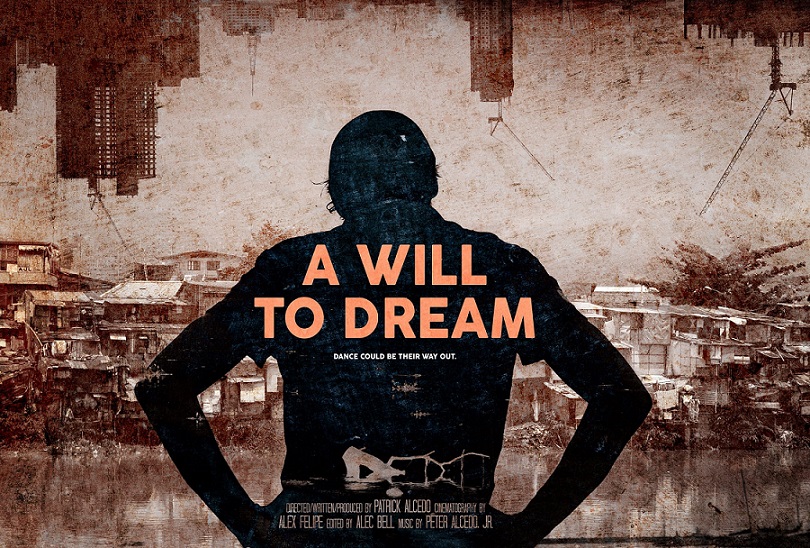
Poster photo from the documentary, “They Call Me Dax.”
A short documentary on a 15-year old student trying to survive as a ballet dancer won the Best Short Documentary at the Cannes Indies Cinema Awards.
Entitled They Call Me Dax, the documentary was written and directed by Filipino filmmaker Patrick Alcedo who is based in Toronto, Canada.
The same documentary is now an official nominee in another online festival Phoenix Shorts in Toronto where jury selects the winners of each category through private screenings.
Another docu, A Will to Dream, is now an official entry in the Chicago Indie Film Awards.
“I was of course elated,” director Alcedo told Vera Files. “I was also surprised my film got notice in an international film competition.”
He is not totally strange to awards as his first feature length docu, A Piece of Paradise, won the Best Canadian Film Award and the Best First Feature Film Award at the 2017 Toronto Reel Asian International Film Festival.
To his knowledge, his film was the first to receive back-to-back win in the festival’s 20-year history.
Alcedo said his love affair with documentaries started in 2009. “Thus far, I have directed, written, and produced nine films. My previous domestic partner, Fruto Corre, is a documentary filmmaker. He was the one who encouraged me to go into documentary filmmaking as an additional platform in disseminating my research on dance and culture. Watching his works and working side-by-side and collaborating with him for years made me fall in love with filmmaking.”

Filmmaker Patrick Alcedo. Fascinated by Filipinos in the arts regardless of social status.
A native of Andagao, Aklan, Alcedo said he grew up dancing in the Ati-atihan festival in Kalibo. “I was also born in a family of dancers and musicians. Hence, expressing externally one’s culture, grace, and emotion has always been a part of me. My father was a lover of films. As a young boy, he would bring me to my hometown’s cinemas where I would be vicariously brought to worlds and lives outside my own. Each time, I would be spellbound by that kind of ‘travel’ my father would give me.”
Presently chair and associate professor in the Department of Dance at York University in Toronto Canada, the filmmaker believes documentaries are powerful on their own. “They have a kind of immediacy and connection that is unique from the written text. As a dance anthropologist, I consider docus as incredible partners to my written publications and to my own teaching and promotion of Filipino expressive culture within the Philippines and in the diaspora.”
They Call Me Dax along with his two new docus, A Will to Dream (feature-length, 90 minutes) and Am I Being Selfish (short, 8 minutes) were all funded by Canada’s Social Sciences and Humanities Research Council Grant and the Canada Council for the Arts.
The pre-production phase of these films was under the auspices of the Early Researcher Award he received from the Government of Ontario.
It’s really in Toronto were he started producing his body of works in documentary filmmaking.
The production for They Call Me Dax took three months and the post-production close to year.
“Thanks goodness the filming was completed before the pandemic! But the post-production — editing, color correction, subtitling, musical scoring –was done at the height of the pandemic. My editor and I had to learn how to communicate via FB messenger, mobile phone, and email. I also had to make sure that my Vimeo was a professional account to allow for uploading of several drafts and studies for vetting and approval,” he recounted post-production blues of the docu.

Another Alcedo docu, “A Will To Dream.”
His first docu was Boxing in The Shadow of Pacquiao which was cited in the New York Times. He also made three films about the Ati-atihan festival.
His later output includes A Piece of Paradise followed by Dancing Manilenyos, a 20-minute docu that juxtaposes the life of a poor male dancer to that of a rich, privileged female dancer who are members of Ballet Philippines.It was an official selection at the 2019 Diversity in Cannes Short Film Showcase. It received an Award of Recognition at the 2018 Hollywood International Independent Documentary Film Award.
He explains his passion for documenting life of performing artists. “As a dance anthropologist, I am passionate about putting a spotlight on the ability of dance to empower the marginalized. I want to illustrate that dance is an incredible embodied form in understanding the complexities of race, class, ethnicity, gender, religious practices, and diasporic/transnational identities.”
As a Philippine Studies scholar, he said he devotes all his energies and resources to fleshing out who we are as Filipinos whether in the Philippines or in transnational elsewhere. “I believe I work best mostly from the point of view of dance and our own dancing bodies.”
This article is also carried by ABS-CBN online.
